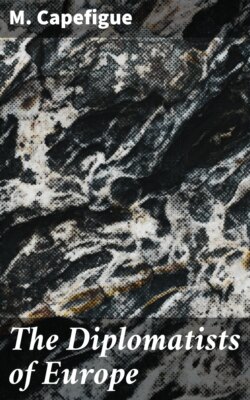The Diplomatists of Europe

Реклама. ООО «ЛитРес», ИНН: 7719571260.
Оглавление
M. Capefigue. The Diplomatists of Europe
The Diplomatists of Europe
Table of Contents
AUTHOR'S PREFACE
PRINCE METTERNICH
M. DE TALLEYRAND.[7]
COUNT POZZO DI BORGO
M. PASQUIER
THE DUKE OF WELLINGTON
THE DUC DE RICHELIEU
PRINCE HARDENBERG
COUNT NESSELRODE
LORD CASTLEREAGH
Footnote
Отрывок из книги
M. Capefigue
Published by Good Press, 2021
.....
The mission of Prince Schwartzenberg and Count Bubna, at Paris, was conducted in the same spirit. Without giving up the alliance, the Austrian government signified that it could no longer rest upon the same basis, in fact, that they must take a more decided part in the approaching military crisis. Metternich's object in this new negotiation was to lay the foundation for a general peace. Such a resolution was by no means disinterested on his part, for, in the new settlement of the boundaries of the different states of Europe which must ensue, Austria would obtain an accession of territory, as a consequence of the position in which the course of events had placed her. The English party was gaining ground at Vienna, and Lord Walpole had arrived with offers of subsidies and augmentation of territory; in proportion, also, as the French army met with fresh reverses, the popular feeling of Germany assumed a more decided character; still Metternich persisted in his mediatorial system, from the conviction that it would be for the real advantage of his country.
These negotiations continued all through the winter of 1812-13. In the meanwhile, M. Otto had been replaced by Count Louis de Narbonne, the representative of the family alliance. He had been appointed by Napoleon, in the hope that his presence would remind Austria that an archduchess sat upon the throne of France; and, by the decree of the senate and the emperor, this same archduchess had just been officially proclaimed regent during the absence of Napoleon: the government being placed in her hands was a fresh guarantee to Austria of the personal feelings of the emperor's son-in-law. In politics alliances are formed upon positive interests, and Napoleon had too greatly abused his victories; the decree had gone forth, the empire, which extended from Hamburg to Venice—the protectorate, which pressed heavily upon Germany, Prussia, Italy, Switzerland, and Holland—the diplomatic oppression which burdened Sweden and Denmark—all must have an end: after action, a reaction must be expected.
.....